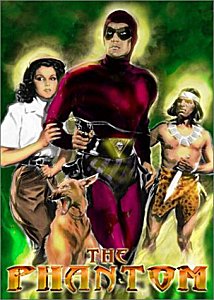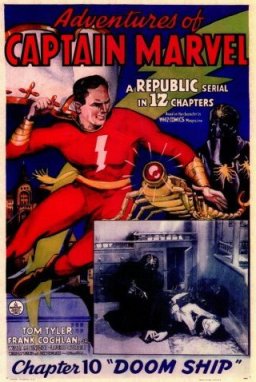
Adventures of Captain Marvel is a 1941 American 12-chapter black-and-white movie serial from Republic Pictures, produced by Hiram S. Brown, Jr., directed by John English and William Witney, that stars Tom Tyler in the title role of Captain Marvel and Frank Coghlan, Jr. as his alter ego, Billy Batson. The serial was adapted from the popular Captain Marvel comic book character, then appearing in the Fawcett Comics publications Whiz Comics and Captain Marvel Adventures. The character is now owned by DC Comics and is known as Shazam.

Captain Video: Master of the Stratosphere is an American adventure horror science fiction film 15-chapter serial released by Columbia Pictures in 1951. It was directed by Spencer Gordon Bennet and Wallace A. Grissel with a screenplay by Royal G. Cole, Sherman I. Lowe and Joseph F. Poland, based on a treatment by George H. Plympton. The serial is unique for several reasons--- in particular, it is the only film serial ever based on a television program, Captain Video and His Video Rangers.

The Lost Planet is a 1953 American science fiction serial film 15-chapter serial which has the distinction of being the last interplanetary-themed sound serial ever made. It was directed by Spencer Gordon Bennet with a screenplay by George H. Plympton and Arthur Hoerl. It appears to have been planned as a sequel to the earlier chapterplay Captain Video: Master of the Stratosphere and shares many plot-points, props and sets, as well as some of the same cast. However, the Video Rangers do not appear, and their uniforms are instead worn by "slaves" created electronically by Reckov, the dictator of the Lost Planet with the help of mad scientist Dr. Grood and enslaved "good" scientist Professor Dorn.

The Adventures of Captain Africa is a 1955 adventure serial film directed by Spencer Gordon Bennet and starring John Hart.

Ace Drummond is a Universal Pictures 1936 film serial based on the comic strip "Ace Drummond" written by Captain Eddie Rickenbacker and drawn by Clayton Knight. The serial's cast features John King, Jean Rogers, Noah Beery Jr. and Jackie Morrow, with Lon Chaney Jr. in a supporting role.

Darkest Africa (1936) is a Republic movie serial. This was the first serial produced by Republic Pictures and was a loose sequel to a Mascot Pictures serial called The Lost Jungle, also starring Clyde Beatty. Mascot, and other companies, had been taken over in 1935 by Consolidated Film Laboratories and merged to become Republic. Producer Nat Levine was formerly the owner of Mascot Pictures.

Dick Tracy vs. Crime, Inc. (1941) is a Republic Movie serial based on the Dick Tracy comic strip. It was directed by the team of William Witney and John English with Ralph Byrd reprising his role from the earlier serials. It was the last of the four Dick Tracy serials produced by Republic, although Ralph Byrd went on to portray the character again in two features and on television.
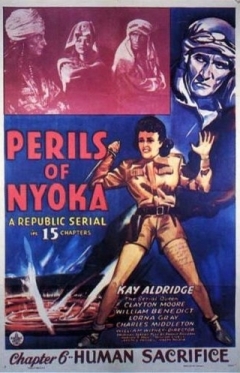
Perils of Nyoka is a 1942 Republic serial directed by William Witney. It stars Kay Aldridge as Nyoka the Jungle Girl, a character who first appeared in the Edgar Rice Burroughs-inspired serial Jungle Girl.

Haunted Harbor (1944) is a Republic serial, based on the novel by Ewart Adamson.

Jungle Drums of Africa is a 1953 12-episode American serial film shot in black-and-white. It was an original commissioned screenplay by Ronald Davidson produced by Franklin Adreon and directed by Fred C. Brannon for Republic Pictures. The story is set in Kenya, and involves the efforts of an American uranium processing company's representative and a woman medical missionary, to thwart the efforts of agents of a "foreign power", abetted by a disaffected native witchdoctor, to gain control of a large uranium deposit on lands owned by the latter's tribe. This serial features black American actors in major roles, including that of a college-educated chieftain.

Captain America is a 1944 Republic black-and-white 15-chapter serial film loosely based on the Timely Comics character Captain America. It was the last Republic serial made about a superhero. It also has the distinction of being the most expensive serial that Republic ever made. It stands as the first theatrical release connected to a Marvel character. The film was re-released in 1953 and it was released in Turkey in popular before the release of the original comics, Turkish Captain America films was also produced such as 1968 film Binbaşı Tayfun and 1973 film 3 Dev Adam. It was the first live-action rendition of a Marvel character before Captain America live action segmnet by Arthur Pierce of the 1966 television series The Marvel Super Heroes in 1966, and Spider-Man appeared in the Spidey Super Stories segment of the children's television series The Electric Company in 1974.

The Call of the Savage (1935) is a Universal film serial based on the story Jan of the Jungle by Otis Adelbert Kline. It was directed by Lew Landers and released by Universal Pictures.

Bruce Gentry – Daredevil of the Skies (1949) is a 15-episode Columbia Pictures movie serial based on the Bruce Gentry comic strip created by Ray Bailey. It features the first cinematic appearance of a flying saucer, as the secret weapon of the villainous Recorder.

Brick Bradford (1947) was the 35th serial released by Columbia Pictures. It was based on the comic strip Brick Bradford, which was created by Clarence Gray and William Ritt.
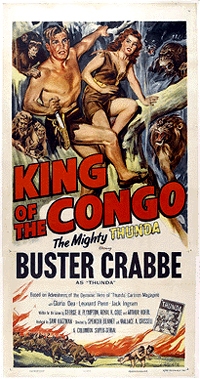
King of the Congo is a 1952 American 15 chapter movie serial, the 48th released by Columbia Pictures. It was produced by Sam Katzman, directed by Spencer Gordon Bennet and Wallace Grissell, and stars Buster Crabbe. The serial also co-stars Gloria Dea, Leonard Penn, Jack Ingram, Rick Vallin, Nick Stuart, William Fawcett, and Rusty Wescoatt. King of the Congo was based on the comic book character "Thun'da", created by Frank Frazetta, and published by Magazine Enterprises.

Adventures of Sir Galahad is the 41st serial released in 1949 by Columbia Pictures. Directed by Spencer Gordon Bennet, it stars George Reeves, Nelson Leigh, William Fawcett, Hugh Prosser, and Lois Hall. It was based on Arthurian legend, one of the very few serials of the time with a period setting that was not a western.
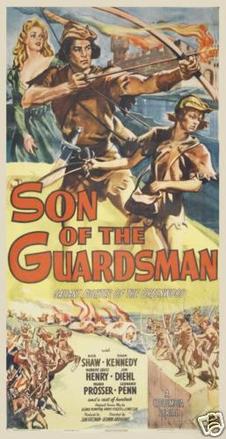
Son of the Guardsman is an American film serial released in 1946 by Columbia Pictures. It was the 31st of the 57 serials produced by that studio.

Mysterious Island is a 1951 American 15-chapter movie serial from Columbia Pictures, the studio's 46th, that stars Richard Crane, Marshall Reed, Karen Randle, and Ralph Hodges. It is an adaptation of Jules Verne's 1874 novel, The Mysterious Island. As in the original story, which was Verne's follow-up to Twenty Thousand Leagues Under the Seas, this serial is set in 1865. However, Columbia's screenwriters added alien Mercurians as an additional set of villains. The serial has been labeled a space opera version of Verne's novel.

Blackhawk is a 1952 American 15-chapter superhero movie serial from Columbia Pictures, based on the comic book Blackhawk, first published by Quality Comics, but later owned by competitor DC Comics. It was Columbia's forty-ninth serial. The one-sheet poster referred to the serial as The Miraculous Blackhawk: Freedom's Champion. The home video release added the tagline: "Fearless Champion of Freedom". The actual on-screen title is Blackhawk: Fearless Champion of Freedom.
